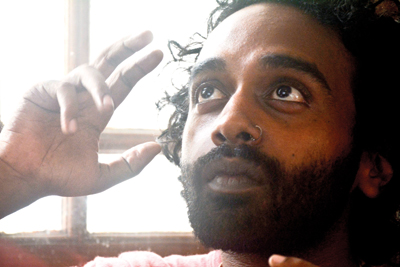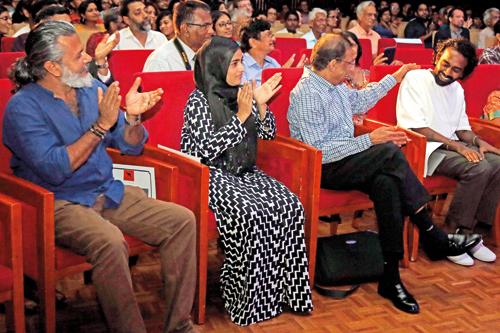The stage is his one sanctuary

Arun Welandawe-Prematilleke: Breaking boundaries. Pic by Ishanka Sunimal
Arun Welandawe-Prematilleke’s great asset in his role as an actor (for he is also a playwright and a director) are his expressive eyes. Their subtly accusing defiant glance seems to confront you at times with the spirit of Felipa de Souza (the openly gay Brazilian woman who fell foul of the Catholic inquisition in the 16th century). But he knows that he has been highly fortunate as a queer person. For, among other things, he has had a family open enough to accept his homosexuality- never quelling, early on, if their children chose to express their gender differently.
Arun, the winner of the 26th Gratiaen Prize for Creative Writing in English for his play The One Who Loves You So, was born in Helsinki, to architect parents who returned to Colombo when he was four. A Nordic chic ménage, with liberated views on matters like gender, made the atmosphere at school seem hot and stifling in contrast. To describe his early schooling at D. S. Senanayake Vidyalaya and S. Thomas’ Prep School, he won’t forego adjectives like ‘constricting’ or ‘Victorian’.
So even with a supportive home, Arun came out late- in his mid-20s. He is aware that, for those without that luxury of family solidarity, coming to terms with being gay could seem an impossible leap.
His first fling with the stage came when he fell in love with the glittering Andrew Lloyd Webber musical Cats- a flamboyant, feline fantasy- aged seven. He directed it making his sister’s friends pirouette to his tunes.
It was aboard a flight, during the inquisitive early teens, that Arun came upon Michael Cunningham’s The Hours. The Pulitzer-winning novel dramatically awakened him to queer sensibility, although it dealt with lesbians not men. Later, films by the Spaniard Pedro Almodóvar, particularly All about My Mother, would give him wings, with their bold, “unapologetic queerness”. He would be liberated by these films which explored the rainbow-hued non-binary- in terms of both sexuality and gender: the source of ‘pride’ that dances in his liquid eyes.

Winning moment: Congratulations from fellow short-listed writers at the Gratiaen award ceremony on June 9 at the BMICH. Pic by M.A. Pushpa Kumara
At this point Arun reminds me that his Gratiaen winning play, The One Who Loves You So, where fluidity of gender and sexuality was one theme, was not autobiographical. He was neither of the characters- he just used some of his experiences.
Putting a theatrical spin on seminal experiences was a habit since 11. The stage is his one sanctuary. Even the very limitations of being a dramatist fit him just right. “What is so exciting is there are strict guidelines- it’s so structured- so you only have a certain way to express yourself. I can’t say, now this person is feeling this way.
“I was always interested by how people behave, how they interact and how their bodies belie meanings they don’t want to express.
“That gap between what you want to say and what you don’t want to say- what we give away when we are trying to conceal- that’s what’s so exciting to me (to portray).”
After finishing his schooling at Asian International School, Arun got into Mind Adventures, where he did Chatroom, his first play, aged 19. But it was attending Goldsmiths, University of London, where he studied drama and theatre arts, that outdazzles everything.
London was the venue for an intoxicating youth. During the Edinburgh Fringe Festival where he performed, every night at 9 he would take his curtain call and then rush to change to his uniform for his job at a silent disco- which went on till 4.30 in the morning. Get up at noon, bleary, to go around the city to get people to come for the show. And repeat- for the 22 consecutive days of the festival.
It was a reckless existence- including wild parties with friends which would get him banned from places. Among psychedelic high points of London life was performing at the Shunt, a hip art space under the London Bridge. The whole great metropolis was their playground.
In contrast to this electric social life is the fact that Arun is fated to feel nowhere at home. Whether in Helsinki, Colombo or London, he was always ‘the other’- “an outsider tapping the glass and looking into other people”. His sexuality, and a life portioned between East and West, ensured this. But this otherness is precisely what makes him such a brilliant, incisive thespian, best known in Colombo for two immersive plays he did to great acclaim- Paraya (‘outsider’) and Closer to the Bone.
Today, he is trying to immerse himself in writing, eight hours a day- much more challenging than acting or directing. “And all the clichés are true: nothing’s scarier than the empty page.”
Once he does struggle through, the result is highly gratifying. His ambition: to move away from familiar themes, feeding audiences things less and less easy to swallow, even though he knows this can annoy many people who want their favourite artistes to stick to their ‘usual’. But as an audience member, he is more interested in seeing artists he loves trying new things and succeeding, rather than rearrange the same motifs time and again.


